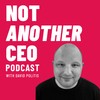
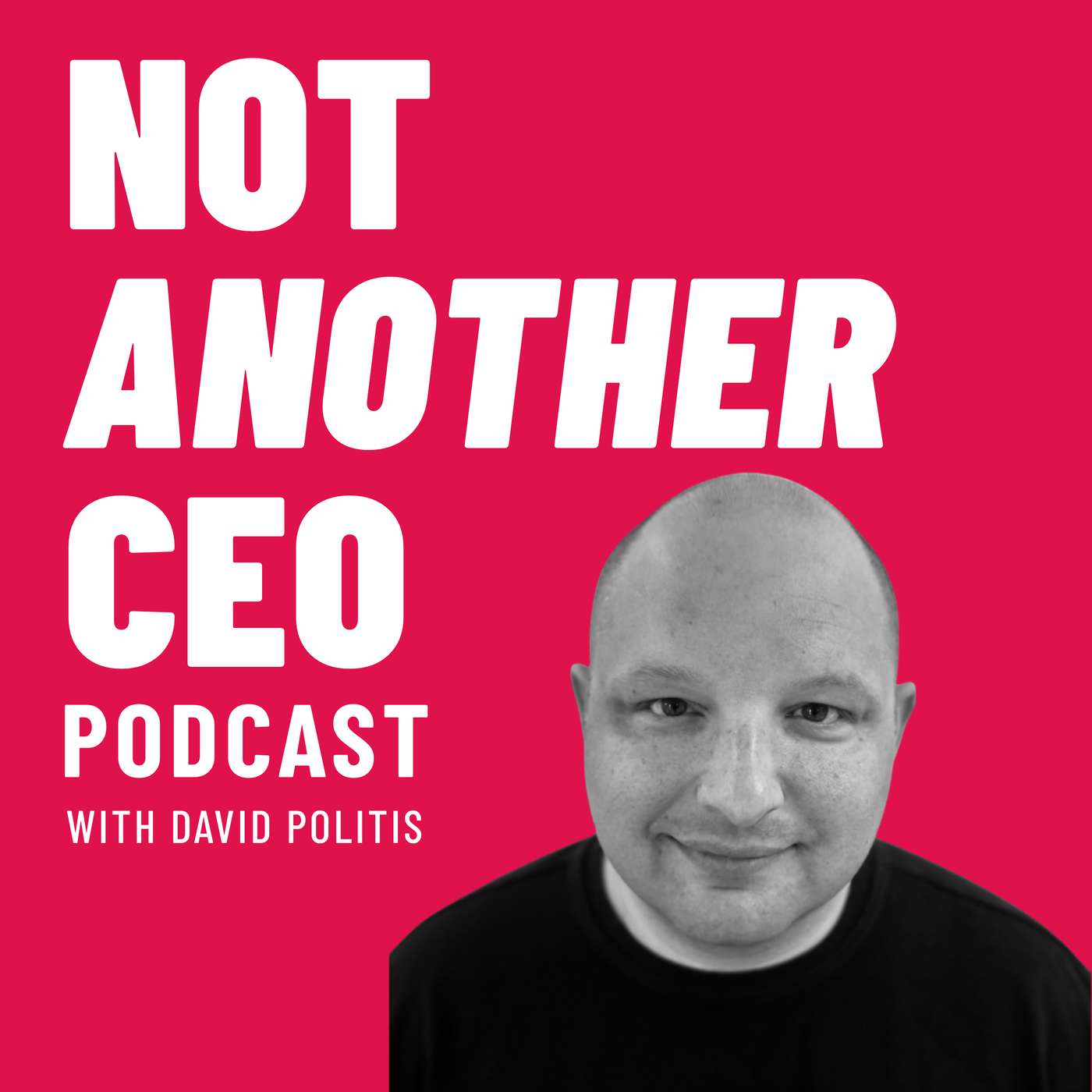
Not Another CEO Podcast
Not Another CEO
Our mission is to bend the curve for Founders and CEOs.
At Not Another CEO, we know there’s no formula for running a business. Leadership is forged through unique journeys, real challenges, and hard lessons. Our exclusive content showcases unfiltered stories and practical guidance from those who’ve crawled through the trenches. Our platform offers the largest library of CEO insights and how-to guides, sourced directly from a diverse community of leaders.
Find our full video library, detailed playbooks, deep dives, and lessons learned on our Substack here ➡️ https://notanotherceo.substack.com/
At Not Another CEO, we know there’s no formula for running a business. Leadership is forged through unique journeys, real challenges, and hard lessons. Our exclusive content showcases unfiltered stories and practical guidance from those who’ve crawled through the trenches. Our platform offers the largest library of CEO insights and how-to guides, sourced directly from a diverse community of leaders.
Find our full video library, detailed playbooks, deep dives, and lessons learned on our Substack here ➡️ https://notanotherceo.substack.com/
Episodes
Mentioned books
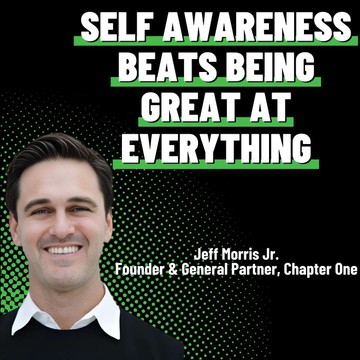
Jan 27, 2026 • 46min
Creating Leverage with Speed - Jeff Morris Jr. - Chapter One - Episode #83
How do you know if a company is actually building momentum, or just looking polished on the surface? In this episode of Not Another CEO Podcast, David sits down with Jeff Morris Jr., Founder and General Partner at Chapter One, to break down what truly matters at the earliest stages of building a company. Jeff invests at pre-seed and seed, where ambiguity is high, data is limited, and speed of learning is often the only real signal. Before becoming an investor, Jeff was an early product leader at Tinder, helping scale the product to hundreds of millions of users, an experience that deeply shapes how he evaluates founders today.Jeff shares how he thinks about product velocity, founder self-awareness, team dynamics, and why the individual partner matters far more than the firm logo. This conversation is a masterclass for CEOs building from zero to one and choosing who they want in the trenches with them. Takeaways: Product Velocity Matters: Jeff emphasizes the importance of product velocity, especially in the early stages of a startup. He explains that founders need to run numerous experiments to achieve product-market fit, often partnering with technical leaders to accelerate this process.Building the Right Team: According to Jeff, a strong indication of a founder's potential is their ability to attract a talented team. He believes that successful founders often draw in colleagues from their previous ventures, creating a "band" that's been together through various challenges.The Sales Dilemma: Founders with technical expertise often lack strong sales skills. Jeff looks for self-awareness in founders, assessing if they can identify their weaknesses and augment them with the right partners or co-founders.The Importance of Early Impressions: First impressions are crucial in the VC world. Jeff and David both agree that initial meetings often determine whether an investor leans in. Founders should craft a compelling story and use the first few minutes to capture interest.Aligning with the Right Investor: For Jeff, investing is akin to a decade-long partnership. He advises founders to seek investors who align with their vision and are genuinely interested in their success, rather than just providing capital.Preparation and Self-Awareness: Founders need to be brutally honest about their strengths and weaknesses. Jeff advises preparing thoroughly before meeting investors and leveraging one's unique strengths while addressing weaknesses to form a complete leadership package.Quote of the Show:“We talk a lot about product velocity being the most critical metric we look for." - Jeff Morris Jr.Links:LinkedIn: https://www.linkedin.com/in/jeffmorrisjr/ Website: https://chapterone.com/ Ways to Tune In:Substack: https://notanotherceo.substack.com/Spotify: https://open.spotify.com/show/1NQ9oAB2XKlgWeL8iEQXg0 Apple Podcasts: https://podcasts.apple.com/us/podcast/not-another-ceo-podcast/id1751581707 YouTube: https://www.youtube.com/@NotAnotherCEOPodcast Transistor: https://podcast.notanotherceo.com/ #NotAnotherCEO #BusinessSuccess #ChapterOneChapters:00:00 Intro01:10 Key Metrics for Early-Stage Investments02:37 Assessing Founders and Teams07:51 The Importance of Self-Awareness in Founders10:38 The Founder-Investor Relationship14:34 Navigating the Venture Capital Landscape19:12 The Dynamics of Fundraising27:36 The Current Investment Climate41:44 Jeff Morris, Jr.'s Journey to Venture Capital44:39 Outro
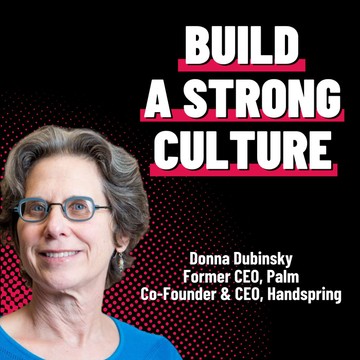
Jan 20, 2026 • 1h 10min
Pioneering Tech and Culture - Donna Dubinsky - Palm & Handspring - Episode #82
How do you create a work culture that stands out and inspires team loyalty across multiple companies? In this episode, we gain valuable insights on this and more from the illustrious career of Donna Dubinsky. Known for her pivotal roles at Palm Computing and Handspring, Donna offers a rare long-term perspective on leadership, culture, and the technological landscape that has spanned decades. Takeaways: The Importance of Building a Strong Culture: Donna emphasizes that a great company starts with great people. She shares the crucial role a positive culture played in her companies, stating that when you foster an environment people love, they follow you from venture to venture.Adaptability is Key: One of the most sought-after traits in employees, according to Donna, is flexibility. She highlights the importance of hiring individuals who are not rigid in their thinking but can pivot and grow with the company.Challenges of Raising Capital: Donna recounts the struggles in securing investment for Palm, despite her extensive network. She faced skepticism from investors due to previous failures in handheld computing and the prioritization of internet ventures over hardware.Reflective Organizational Planning: Donna shares her strategic approach to planning through biannual offsites, fostering a culture of reflection and adjustment. These sessions not only solidified strategic objectives but also enhanced team camaraderie through collaborative efforts and fun activities.Maintaining Integrity and Respect: Donna’s overarching advice is to treat everyone with respect. This principle was foundational in building the cultures of her companies and remains a critical lesson for sustainable leadership.Quote of the Show:“I really appreciated people who could deal with change. Changing circumstances, changing environment, changes within the company, as opposed to people who were rigid." - Donna DubinskyWays to Tune In:Substack: https://notanotherceo.substack.com/Spotify: https://open.spotify.com/show/1NQ9oAB2XKlgWeL8iEQXg0 Apple Podcasts: https://podcasts.apple.com/us/podcast/not-another-ceo-podcast/id1751581707 YouTube: https://www.youtube.com/@NotAnotherCEOPodcast Transistor: https://podcast.notanotherceo.com/ #NotAnotherCEO #BusinessSuccess #Handspring #PalmChapters:00:00 Intro01:30 The Importance of People in Building Companies03:42 Creating and Maintaining Company Culture16:00 The Palm Story: Revolutionizing Personal Computing37:09 Frustrations of Being an Employee37:44 Challenges of Selling a Company39:02 Balancing Structure in Big Companies40:55 Starting Handspring and Product Focus45:03 Biggest Mistake at Handspring49:00 Advice for Fast-Growing Companies50:28 Impact of AI and Market Dynamics55:05 Personal Background and Career Beginnings57:33 Big Breaks and Mentorship01:03:06 Government Service and National Impact01:07:49 Outro
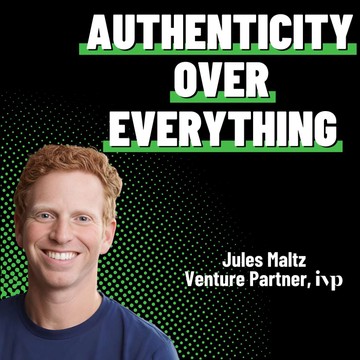
Jan 13, 2026 • 55min
Investing in the Next Chapter - Jules Maltz - IVP - Episode #81
How do great founders use their best moments, not their hardest ones, to build the future of their company?In this episode, Jules Maltz shares the mindset that has guided him through decades of backing generational companies like Slack, Dropbox, Grammarly, MuleSoft, G2, and Buddy Media. For Jules, the brightest periods in a company’s journey are the moments to build aggressively: to hire exceptional executives, deepen product moats, and prepare for act two and act three long before the market forces the issue.Jules also opens up about what he looks for in founders, why authenticity matters more than pitch polish, and how trust is built in the first months of an investor–founder relationship. He reflects on his own misses, the evolution of venture capital, and the emotional clarity that underpins his earliest investment decisions. Takeaways: Authenticity and Passion are Essential: Jules emphasizes the importance of authenticity and passion in founders. He looks for individuals who have a genuine drive and a personal connection to the problem they are solving.Beyond the Metrics: When evaluating potential investments, Jules seeks stories that transcend traditional metrics. He recalls his first investment in Twitter, where the pitch focused more on the transformative potential of the platform rather than immediate financial returns.Building Trust Early On: Establishing trust during the initial months after an investment is crucial. Jules believes that consistently delivering on promises and being genuinely helpful builds credibility.Adapting Communication Styles: Jules adapts his communication style based on the needs of each CEO. Some prefer regular updates, while others might communicate only during key events.Sustaining Growth Through Strategic Hiring: Jules advises companies to recruit strong executives and think ahead about their business strategies during periods of growth. By doing so, businesses can better navigate market changes and sustain their growth trajectory.Nurturing Relationships for Long-Term Success: Relationships are at the heart of venture capital. Whether it's trust between founders and investors or maintaining connections with past business partners, nurturing these relationships can lead to long-term success and learning.Quote of the Show:“When the sun is shining on your business, that’s a great time to recruit super strong executives and think about act two and act three." - Jules MaltzLinks:LinkedIn: https://www.linkedin.com/in/julesmaltz/ Website: https://www.ivp.com/ Ways to Tune In:Substack: https://notanotherceo.substack.com/Spotify: https://open.spotify.com/show/1NQ9oAB2XKlgWeL8iEQXg0 Apple Podcasts: https://podcasts.apple.com/us/podcast/not-another-ceo-podcast/id1751581707 YouTube: https://www.youtube.com/@NotAnotherCEOPodcast Transistor: https://podcast.notanotherceo.com/ #NotAnotherCEO #BusinessSuccess #IVPChapters:00:00 Intro01:25 Key Traits of Successful Founders03:52 The Importance of Authenticity06:17 Evaluating Investment Opportunities10:59 The Twitter Investment Story21:57 Building Trust with Founders27:11 Trusting Your CEO's Vision29:31 Navigating Hypergrowth and Market Changes33:53 The Excitement and Challenges of AI Investments41:51 Teaching and Sharing Venture Capital Insights47:24 The Role of Trust in Venture Capital50:35 Biggest Investment Regrets53:31 Outro
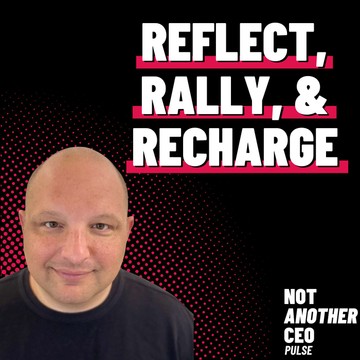
Dec 18, 2025 • 15min
December Pulse - Maximize Your Year-End - Episode #80
How can you get the most out of your year-end? In this solo episode of Not Another CEO Podcast, David explores how leaders can leverage the end of the year for reflection, rallying their troops, and recharging for what lies ahead.Ways to Tune In:Substack: https://notanotherceo.substack.com/Spotify: https://open.spotify.com/show/1NQ9oAB2XKlgWeL8iEQXg0 Apple Podcasts: https://podcasts.apple.com/us/podcast/not-another-ceo-podcast/id1751581707 YouTube: https://www.youtube.com/@NotAnotherCEOPodcast Transistor: https://podcast.notanotherceo.com/ #NotAnotherCEO #BusinessSuccess #DecemberCEOPulseChapters:00:00 Intro01:22 Reflect: Assessing Achievements05:15 Rally: Energizing Your Team11:14 Recharge: Taking Time to Rest13:33 Outro

Dec 16, 2025 • 60min
Survival Through Determination - Artem Rodichev - Ex Human - Episode #79
How do you keep building when every month your company is almost out of money, and quitting would be the logical choice?In this episode, Artem Rodichev shares the gritty, unfiltered story of Ex Human’s near-death year. Instead of shutting the company down, that year hardened the team, shaped the culture, and created a level of resilience that became Ex Human’s defining advantage.Now Ex Human is profitable and building empathetic AI characters capable of multimodal emotional intelligence, technology designed to see, hear, and feel in ways that help combat loneliness. Artem also discusses his path from leading AI at Replica to building a company that spans both consumer and enterprise markets, powered by millions of user-created AI characters that generate a unique data advantage. Takeaways:Persistent Belief in Your Vision: Artem emphasized the importance of having unwavering belief in your mission. His steadfast belief in the potential of AI to create meaningful human interactions kept him going through challenging times.Foster a Culture of Resourcefulness and Persistence: The trials that Ex Human endured became pivotal learning experiences, instilling a culture of resourcefulness and persistence within the team. Be Prepared for Sacrifices: Artem candidly discussed the personal sacrifices he made, including taking a salary below market rate and making hard personnel decisions. Expand Beyond Comfort Zones: Despite an engineering background, Artem knew he needed to step out of his comfort zone and learn essential skills like marketing and sales to lead Ex Human effectively.Data-Driven Innovation: Ex Human’s success hinges on continuously refining their AI models with data collected from their consumer app. This iterative approach allows them to stay ahead in the competitive AI market.Transitioning from a Stable Job to Entrepreneurship: Artem’s move from a significant role at Replica to founding his startup showcases the courage needed to leave stability behind in pursuit of a bigger vision.Quote of the Show:“Every month I thought I should give up. But then the other side of me said, if you give up now, you’ll never build the future you believe in." - Artem RodichevLinks:LinkedIn: https://www.linkedin.com/in/art-rodichev/ Website: https://exh.ai/#home Ways to Tune In:Substack: https://notanotherceo.substack.com/Spotify: https://open.spotify.com/show/1NQ9oAB2XKlgWeL8iEQXg0 Apple Podcasts: https://podcasts.apple.com/us/podcast/not-another-ceo-podcast/id1751581707 YouTube: https://www.youtube.com/@NotAnotherCEOPodcast Transistor: https://podcast.notanotherceo.com/ #NotAnotherCEO #BusinessSuccess #ExHumanChapters:00:00 Intro01:24 The Importance of Persistence04:33 Belief in the Vision05:53 Personal Sacrifices and Company Culture11:07 Solo Founder Challenges12:29 Building a Strong Team14:45 The Role of a Founder18:47 Consumer AI and Empathetic Companions29:41 Breaking Inertia: Leaving a Successful Company32:06 Limitations and New Opportunities: The Birth of a New Venture34:50 B2C and B2B: Balancing Two Markets37:11 The Importance of Data in AI Development42:28 Challenges and Competitions in the AI Market49:41 Personal Background: From Kazakhstan to Tech Entrepreneurship57:00 Final Reflections and Advice for Aspiring Entrepreneurs58:39 Outro
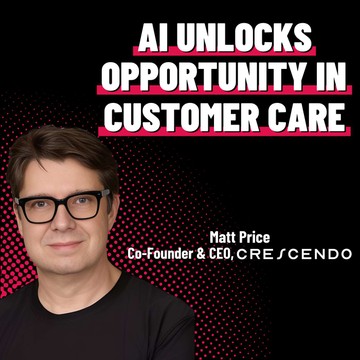
Dec 9, 2025 • 1h 1min
The AI Driven Customer Experience Evolution - Matt Price - Crescendo - Episode #78
How do you scale a company from zero to $100 million in 18 months without losing quality, clarity, or control?In this episode, Matt Price shares the remarkable story of building Crescendo, one of the fastest-growing companies ever featured on the show, by reimagining customer experience through advanced AI and deeply trained specialists. Matt’s journey has come full circle: from a technical support rep early in his career, to scaling Zendesk, to now creating an entirely new model for enterprise-grade customer care.Matt opens up about assembling an elite leadership team in record time, creating a vertically integrated product-and-operations engine, and designing a culture anchored around accountability, curiosity, and constant communication. He also explains why outcome-based pricing changes everything, how General Catalyst’s creation model gave Crescendo an unfair advantage, and why traditional BPOs simply aren’t positioned for the AI era. This is a masterclass in speed, focus, and operational excellence. Takeaways:Building a Stellar Team: Matt emphasized the importance of assembling a high-quality team quickly. He discussed how bringing in top talent, especially those with experience in related fields, has been crucial for Crescendo's rapid growth.Curiosity and Vision as Key Attributes: When recruiting for a fast-growth environment, Matt values curiosity and passion for the company's vision. These attributes, combined with relevant experience, are critical for innovation and progress.Prioritizing Outcomes Over Traditional Models: Crescendo has embraced outcome-based pricing, aligning the company’s success with customer satisfaction. This model contrasts with traditional seat-based pricing and encourages the entire organization to focus on end-to-end service quality.Integrating AI Thoughtfully: Matt spoke about the evolution of AI in customer care and its potential to transform the industry. By integrating AI with human expertise, Crescendo offers enhanced support experiences.Strategic Acquisition for Growth: The strategic acquisition of traditional BPOs has allowed Crescendo to expand its distribution and offer scalable AI solutions. Matt's approach underscores the power of mergers and acquisitions in achieving rapid growth.Creating a Culture of Accountability: Matt stressed the significance of having someone accountable for leading every project or initiative. In a fast-paced environment, clarity in roles and responsibilities is vital for efficiency and progress.Fostering Open Communication: Maintaining open communication channels, even in remote settings, is a priority for Crescendo's leadership. Matt ensures his team stays connected through regular meetings and an open-door policy.Quote of the Show:“Customer care was constrained by the economics. In order to deliver customer care up to now, you have to put humans in, a lot of people in… and AI now changes that, AI puts us into a world of abundance. And we need to shift our mindsets now as CX leaders… we’re moving from being deflectors to creators and innovators." - Matt Price Links:LinkedIn: https://www.linkedin.com/in/growthspecialist/ Website: https://www.crescendo.ai/ Ways to Tune In:Substack: https://notanotherceo.substack.com/Spotify: https://open.spotify.com/show/1NQ9oAB2XKlgWeL8iEQXg0 Apple Podcasts: https://podcasts.apple.com/us/podcast/not-another-ceo-podcast/id1751581707 YouTube: https://www.youtube.com/@NotAnotherCEOPodcast Transistor: https://podcast.notanotherceo.com/ #NotAnotherCEO #BusinessSuccess #CrescendoChapters:00:00 Intro01:32 Building a High-Impact Team03:40 The Role of AI in Customer Service06:03 Rapid Growth and Company Evolution07:58 Leadership and Team Dynamics11:03 AI Integration and Product Development21:53 Founding Crescendo and Market Opportunities28:10 Challenges and Focus as a CEO31:08 The CEO's Influence on Team Dynamics35:00 Outcome-Based Pricing in SaaS36:22 Challenges and Benefits of Outcome-Based Models41:25 Strategic Growth Through Acquisitions47:04 The Future Vision for Crescendo48:34 Personal Journey and Early Career58:33 Advice for Aspiring Entrepreneurs59:29 Outro
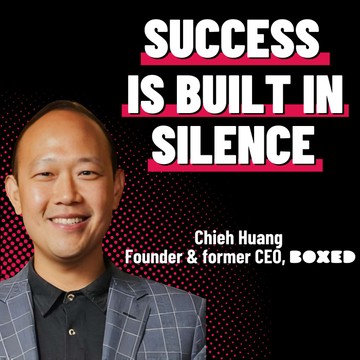
Dec 2, 2025 • 1h 7min
Building Through Broken Glass - Chieh Huang - Boxed - Episode #77
Have you ever wondered what it takes to build a company from your garage to a public entity?In this episode, Chieh Huang shares the raw, unfiltered story of building Boxed from a garage into a national e-commerce brand serving tens of millions of customers, and the emotional toll, unlikely breakthroughs, and market forces that shaped every chapter of the journey. He reflects on the lonely months of almost no orders, the overnight surge that changed everything, the pressure of becoming a public company CEO, and the reality that even the strongest operators can’t outrun macro cycles.Chieh also opens up about what happens after the final chapter closes, the exhaustion, the identity shift, and the unexpected necessity of real recovery. His honesty about the highs, lows, and lessons he’s taking into his next company makes this a powerful episode for founders navigating their own versions of the broken-glass analogy. Takeaways: From Humble Beginnings to a Notable Success: Chieh Huang started Boxed in 2013 right from his garage, with only dreams and a strong will to succeed. Within a few years, Boxed scaled to become a renowned online wholesale retailer, serving millions.The Challenge of Maintaining Purpose: Chieh emphasizes the importance of cultivating an intrinsic purpose within a company. At Boxed, the sense of purpose wasn’t predefined but evolved over time as the team grew, particularly among the fulfillment center workers.The Rollercoaster Ride of Fundraising: Chieh's journey wasn't without financial hurdles. While initial investments were relatively easier owing to his prior success in the gaming industry, subsequent rounds posed challenges, reflecting the inconsistent nature of venture funding.Consumer Business Dynamics: Chieh discusses the unpredictability of consumer businesses, highlighting how a single viral moment or endorsement can drastically influence a company's success, unlike enterprise businesses that grow through steady acquisition of clients.Public Company Experience: Huang's experience in taking Boxed public via a SPAC (Special Purpose Acquisition Company) taught him that public market dynamics significantly differ from private venturesHandling Burnout: Chieh and David discuss the inevitability of burnout in an entrepreneur's journey and the importance of managing it proactively through short breaks, personal downtime, and stepping away when necessary to recharge.Quote of the Show:“Being a CEO is like trying to be the greatest of all time in a broken glass eating competition." - Chieng HuangLinks:LinkedIn: https://www.linkedin.com/in/chiehhuang/ Website: https://boxed.com/ Ways to Tune In:Substack: https://notanotherceo.substack.com/Spotify: https://open.spotify.com/show/1NQ9oAB2XKlgWeL8iEQXg0 Apple Podcasts: https://podcasts.apple.com/us/podcast/not-another-ceo-podcast/id1751581707 YouTube: https://www.youtube.com/@NotAnotherCEOPodcast Transistor: https://podcast.notanotherceo.com/ #NotAnotherCEO #BusinessSuccess #BoxedChapters:00:00 Intro00:46 The Journey of Boxed02:42 The Purpose Behind Boxed07:14 Starting in the Garage09:23 The Big Break and Rapid Growth20:36 Fundraising Challenges and Successes26:02 Navigating Market Ups and Downs32:09 Reflecting on Past Experiences33:59 Journey to Going Public36:26 Challenges of Being a Public Company CEO39:22 Navigating Investor Relationships44:17 Balancing Work and Avoiding Burnout50:03 The End of Boxed and New Beginnings55:03 Early Entrepreneurial Spirit57:54 Role Models and Mentors01:01:25 Core Motivations and Advice01:05:51 Outro
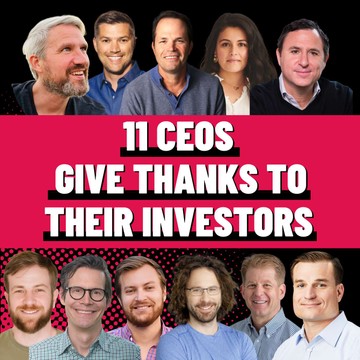
Nov 25, 2025 • 55min
11 CEOs give thanks to their investors - Episode #76
When was the last time you paused long enough to thank the people who quietly helped you build?In this special compilation episode, we highlight moments from eleven CEOs who reflected on the investors that shaped their companies’ trajectories, not just through capital, but through conviction, guidance, and belief. These clips reveal how the right investors help founders stay grounded in their mission, navigate uncertainty, and make better decisions during pivotal moments of growth.Across these stories, one theme stands out: exceptional investors don’t just finance a business, they help founders become better leaders. They open doors, challenge thinking, and offer support that often goes unspoken and uncelebrated. As we head into the holiday season, this episode is an invitation for CEOs to pause, reflect, and acknowledge the people whose partnership made the climb possible.Ways to Tune In:Substack: https://notanotherceo.substack.com/Spotify: https://open.spotify.com/show/1NQ9oAB2XKlgWeL8iEQXg0 Apple Podcasts: https://podcasts.apple.com/us/podcast/not-another-ceo-podcast/id1751581707 YouTube: https://www.youtube.com/@NotAnotherCEOPodcast Transistor: https://podcast.notanotherceo.com/ #NotAnotherCEO #BusinessSuccess Chapters:00:00 Intro02:17 Daniel Chait - Greenhouse02:54 Kyle Porter - Salesloft06:50 Craig Walker - Dialpad13:24 Dane Atkinson - Odeko21:11 Diego Oppenheimer - Algorithmia24:46 Itamar Friedman - Qodo28:43 Jeron Paul - Spiff34:03 Nadia Boujarwah - Dia&Co38:59 Nick Patrick - Radar44:16 Toby Kraus - Lightship53:30 Tom Buiocchi - ServiceChannel54:09 Outro

Nov 20, 2025 • 15min
November Pulse - Driving An AI-First Workplace - Episode #75
How can you motivate your team to embrace AI in their daily work? In this solo episode of Not Another CEO Podcast, David discusses strategies to drive an AI-first mindset in your company.Ways to Tune In:Substack: https://notanotherceo.substack.com/Spotify: https://open.spotify.com/show/1NQ9oAB2XKlgWeL8iEQXg0 Apple Podcasts: https://podcasts.apple.com/us/podcast/not-another-ceo-podcast/id1751581707 YouTube: https://www.youtube.com/@NotAnotherCEOPodcast Transistor: https://podcast.notanotherceo.com/ #NotAnotherCEO #BusinessSuccess #NovemberCEOPulseChapters:00:00 Intro03:16 Get Your Team Using AI06:24 Get Traction With Focused AI Projects10:42 Install A Champion To Own AI14:00 Outro
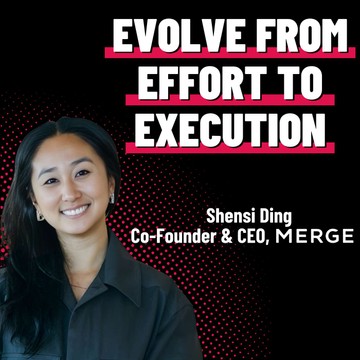
Nov 18, 2025 • 52min
Momentum to Millions - Shensi Ding - Merge - Episode #74
How do you build one of the fastest-growing integration platforms in tech, while keeping culture, momentum, and innovation in sync?In this episode, Shensi Ding, Co-Founder and CEO of Merge, shares her journey from investment banking to leading one of the most successful integration infrastructure companies in the market. She opens up about the company’s evolution, from a small startup in San Francisco to a category leader powering technology products and AI agents for companies like Ramp and OpenAI.Shensi also discusses how she built Merge’s in-person culture during the height of the pandemic, what it takes to recruit top talent, and the lessons she’s learned about decision-making, adaptability, and sustaining momentum as a founder. Takeaways: The Importance of Company Culture: Shensi emphasizes the significance of maintaining an in-person culture at Merge, even amidst the challenging conditions of the COVID-19 pandemic.Maintaining Quality Over Competing on Price: Shensi discusses the challenge of maintaining a premium product in an environment saturated with copycats. She was inspired by the CEO of Gong, who reinforced that a company cannot be both the best and the cheapest.Navigating Growth and Innovation: An integral part of Merge's ethos has been to constantly innovate and adapt, which Shensi highlights by discussing the launch of new products and their strategic shifts towards AI-driven solutions.Integration and Expansion as Key Growth Drivers: Shensi highlights the significance of diversifying Merge’s product offerings and expanding into new markets to drive growth. By strategically adding categories and aiming for enterprise-level clients, Merge has expanded its market reach and increased its potential for acquiring larger clients.Lessons in Leadership and Adaptability: David and Shensi discuss the value of learning from industry veterans and mentors, which Merge facilitates by inviting successful leaders to speak with their team.Navigating Fundraising and Investor Relations: In discussing fundraising experiences, Shensi highlights the importance of clear differentiation and conveying the unique value of your product to investors. While the initial seed round was challenging, securing well-known investors early on eased future fundraising efforts.Quote of the Show:“You can’t be the best and the cheapest. You need to decide what you want to be." - Shensi DingLinks:LinkedIn: https://www.linkedin.com/in/shensiding/ Website: https://www.merge.dev/ Ways to Tune In:Substack: https://notanotherceo.substack.com/Spotify: https://open.spotify.com/show/1NQ9oAB2XKlgWeL8iEQXg0 Apple Podcasts: https://podcasts.apple.com/us/podcast/not-another-ceo-podcast/id1751581707 YouTube: https://www.youtube.com/@NotAnotherCEOPodcast Transistor: https://podcast.notanotherceo.com/ #NotAnotherCEO #BusinessSuccess #MergeChapters:00:00 Intro01:40 Starting Merge During the Pandemic02:50 Challenges of In-Person Work Culture03:42 Expanding to New York and International Markets04:50 Maintaining Work Ethic and Decision Making06:42 Evolving Leadership and Learning from Mistakes10:56 Bringing Industry Leaders to Inspire the Team13:56 Acquiring the First Customers16:38 Dealing with Copycats and Maintaining Quality21:08 Product Evolution and Adapting to AI27:59 The Halo Effect of New Products29:59 Promoting AI Tools Internally33:15 Fundraising Challenges and Successes38:08 Moving Upmarket and Adapting41:42 Founders' Background and Journey47:16 Balancing Work and Personal Life50:41 Outro


